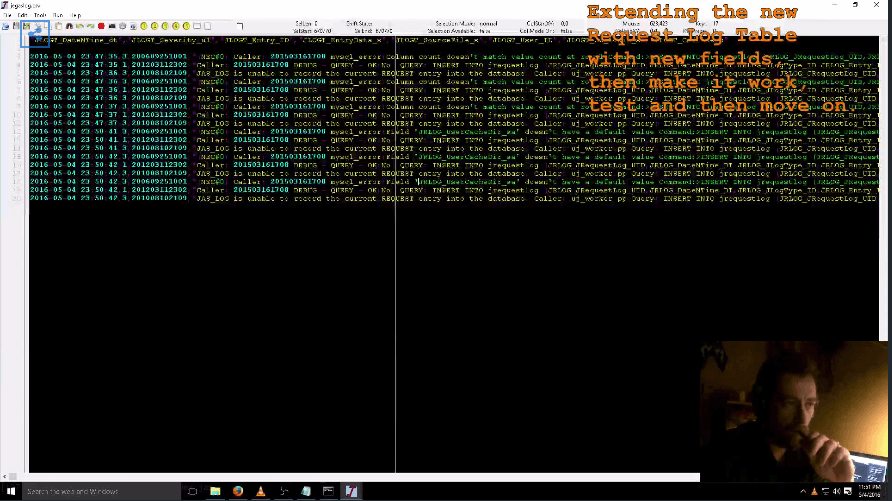
Get to know a retired computer programmer who regularly fends off hackers with some serious Jedi programming. He also plays guitar whenever he can and perhaps sing a bit along with it
Real name: Jason
Alter ego: Jegas
Location: Ellington, USA
Powers/Abilities: C, C++, SQL & Others
Username: https://www.livecoding.tv/jegas/
Profession: Retired Computer Consultant
Questions:
Q: How did you land in the world of programming?
A: I was 10 years old (1981), in a children’s home in Cromwell CT, USA. I was “behaving” enough that the teacher allowed me to join the new “get out of math class opportunity!” YAY… The event? 5 days of computer instruction.
Hmm. A Timex Sinclair with a whopping 2024 bytes of memory, with a 16384 byte (16k) add on cartridge you plugged in the back. The hard drive was a tape cassette. 30 minutes to save maybe five, twenty-five line, pages of BASIC code.
I spent my time after this course programming in a notebook, actual pen, and paper. I made games like the “Choose-Your-Own-Adventure” series of children’s books (but fun for adults too).
So I started programming basic on a notepad after learning like 5 commands maybe: if/then, Print, Goto, Get A$ (ask for a letter or number key) .. I think that was all… and a lot of story writing in between the quotes of the print statements, Example:
40 PRINT “Then the monster looks at you, what do you do?”
50 PRINT “R – RUN”
60 PRINT “F – FIGHT”
70 GET A$
IF A$=”R” then goto 240
Q: What is the best method to learn programming in your opinion?
A: I think the best way to learn programming is by having fun. I don’t know any other way without calling it work.
I recommend starting simple and small. I find when folks set their goals too high and fail, they may feel like they are failures and lose interest when quite the opposite is true in my opinion. I think working your way up gives you both the experience and wherewithal to tackle the more complex things.
Q: What is the most disastrous cyber attack that you have experienced, and how did you manage it?
A: Well, my cable modem was hacked into by a group who targeted me, perhaps because I’m a personality on a programming website, perhaps because one of my programs fends off Blackhat Hackers. I have had two months of drama with a gang of blackhat cyber terrorists!
I added a new firewall system, which normally would give you 2 layers of protection, firewall wise, but as my modem was compromised and my, well known, cable provider refused to help by answering me with “Update your BIOS, is there anything I can help you with?”, he says.
“It’s your modem, they commandeered my modem, they can change the DNS at will. Can you help me with that?”, I say acting calm but IRATE in between my ears.
“Update your BIOS, is there anything I can help you with?”, he says again verbatim with a hint of amusement in his heavily accented voice. So, no joy here.
I established a quarantine and a very “disposable” test area. Scanning was useless, but I saw tons of aftermath. I was hit with missing partitions…after you used em, shutdown, restarted – gone. There was an operating system that was viral in nature, installing itself on OneDrive – and injuring the others, replicating, installing self, and there were sleeper bots (slow your machine to crawl mouse/keyboard, while background processes do evil tasks and you can’t click fast enough (as designed) – pull the cord!!!!
I used my backups, careful processing of “infected” stuff, and I know my particular group has been like stalkers so it’s not over, and I’m never 100% sure something isn’t awry – and there have been small, as in harmless, “breaches” like telling Win10 it’s time to reboot – now because of your last update. I loved that one. Registry entries to cripple anything Microsoft does online, so far – fixed I think.
I don’t have major recommendations here – I saw a major active-monitoring anti-virus system get blitzed and shut down by a virus in the twinkle of an eye! How do I know? That anti-virus program let out a death cry…. It drew a white box, wrote its name on the window title and managed to write WARNI – then blip. PULL THE CORD! It does sound funny but these folks, rob, steal, delete, take data or encrypt data onsite and ask for ransom. So, these BlackHat hackers are definitely in a class of their OWN!!!! (White and Gray hats are NOT in the same group.)
Q: What have you learned in terms of coding from Livecoding.tv until now?
A: For starters, there is a ton here to learn here, there are many great broadcasters, and the community helps each other.
This is a tough question to answer for me because I’m a regular caster and not so regular viewer so I’ll mention this: In my “Show” I learn from viewers all the time, many are friends, regulars. We discuss theory, technology, help folks that come in who might need help with programming language syntax or how to perform a particular job.
Q: What kind of opportunities do you feel Livecoding.tv has opened for you?
A: Livecoding.tv has brought together a lot of talented people under one roof, so to speak. I think there are many opportunities ranging from folks making coding teams for projects, promoting your software and having fun with an esoteric crowd of coders. I haven’t seen too much of this sort of thing except for ONE OS or ONE LANGUAGE type sites/forums.
Q: What programming language has got you the biggest projects?
A: FreePascal. Yup. All my other projects, after tallying it up, were five figure jobs. FreePascal has bested that with one job being 6 figures.
Q: How much have you contributed in guiding new programmers to learn about Jegas Edit?
A: When someone asks about Jegas Edit, I am usually quick to give a demo, and I am candid about where it is strong, weak, and lame. Really, any chance I get to talk about it, I do.
Q: What are your major ongoing Jegas projects that you feel are important for new programmers learning the language?
A: I think the JegasAPI is important because it has a ton of source code, working examples, and it’s a toolbox of stuff to use, like string handling, type conversions, graphic tools, internet tools, database API that is like Microsoft’s ADODB (easy to use), console/ncurses stuff, and low level block reading and writing routines… It has a lot to tinker with.
Q: What are the major shortcomings in your opinion of FreePascal in comparison to C++?
A: FreePascal is not as well known as C++. Additionally, due to C being out first, most of today’s operating system’s are written in it and its ObjectOriented child C++. This popularity brings with it many application programming interfaces like DirectX, cups, MySQL client etc. being written in C/C++. This means that in order to use the C++ shared libraries (POSIX) or DLL’s (Windows) you must write a WRAPPER of sorts to convert how Freepascal Stores Data to the C/++ way and vice versa. The community helps: There has been a DirectX Wrapper for years. You can write your own wrappers or find another library. This is a major drawback to FreePascal, though it remains my favorite language (I Like C++ too, just less) .
Q: What is JAS and how did you get into it?
A: JAS is the result of building code as needed for some work I landed, and it started as a templating system that could do any web anything… It was a bare-bones CMS with database code. I needed data and a way to display it. The JOB: RealEstate Multiple Listing System (MLS) so – with that code and liking Freepascal I kept adding new stuff to my API. Most of my career didn’t involve Freepascal BUT at work, I learned what works and what doesn’t – so I made sure I did my best to let in the good and keep out the bad.
Because half of my career was as a CRM specialist, I’ve been adding CRM features and know-how to JAS off and on for years. It’s a pet project really which grew to be the core of my business and while I was working I turned a nice profit with it.
Q: Is JAS a lot more than a CRM?
A: The JAS (Jegas Application Server) is actually many multi-user systems in one; some are quite functional now, others are placeholders with infrastructure in place, all need work. It’s an infant SAP.
The data-model for these modules are inspired from multiple examples in the real world of what works, and what doesn’t. The goal has always been to make sure the data-model represents real life so data from any system can be imported into it, properly represented.
Functional Modules:
- CRM
- Case Management
- Project Management
- Password Keeper
- BookMarks “Quick Links.”
- Content Management System
- Punk-Be-Gone (Preemptive Defense System keeps as many black hat hackers away as possible).
- Web Server
Less functional, Solid core:
- Warehouse Management – Multi-Location Inventory Tracking
- Accounting – Merely landing zones so far for importing and exporting
Q: Do you think there is a better way of relaxing than playing your tunes on a guitar?
A: Is there a better way to relax than guitar? No…. Maybe…. Nope!
Check out one of Jegas’ recent streams: Working with a touch of JAS








